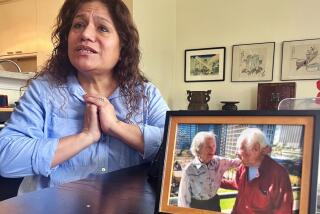The moral of Madoff’s tale
- Share via
In one of his more melancholy moods, Isaac Newton mused that he could measure the movement of distant celestial bodies but could not gauge the magnitude of human folly.
It’s a reflection with a certain compelling relevance given the stunning news that one of the country’s most respected securities traders, Bernard L. Madoff, allegedly has swindled investors out of at least $50 billion. It’s a staggering sum, one that approaches the ghastly totals rolled up by such epochal corporate frauds as Enron and Worldcom. More staggering yet is the roster of victims, which includes not only banks but high-flying hedge funds, professional investors such as Mortimer Zuckerman, cultural luminaries such as Elie Wiesel and Steven Spielberg, an Orthodox Jewish school and a variety of other charitable foundations.
Madoff, moreover, was not some brash outsider. For nearly half a century, he and the firm he founded have been pillars of Wall Street. He and his brother helped create NASDAQ and helped lead the securities trading industry’s transformative conversion to electronic trading.
Robert Graves dismissively quipped that while there is no money in poetry, neither is there poetry in money. As we’ve all recently learned, there sometimes is the stuff of other literary genres: farce and tragedy. There’s a little of each in the proud declaration that was featured on the website Madoff’s firm maintained:
“In an era of faceless organizations owned by other equally faceless organizations, Bernard L. Madoff Investment Securities LLC harks back to an earlier era in the financial world: The owner’s name is on the door. Clients know that Bernard Madoff has a personal interest in maintaining the unblemished record of value, fair-dealing and high ethical standards that has always been the firm’s hallmark.”
In retrospect, it’s a sentiment that brings to mind not Graves but Groucho -- “The secret to life is honesty and fair dealing. If you can fake that, you’ve got it made.” The breathtaking hypocrisy of publishing such a declaration suggests a lesson to be learned, and a mystery to be pondered.
The lesson is one that becomes clearer with each excruciating turn of the Wall Street screw. The long, bipartisan experiment with financial deregulation has failed utterly. The argument that a return to rigorous oversight will somehow stifle Wall Street’s “creativity” is no longer convincing. Whatever its theoretical costs, regulation is dramatically cheaper than intervention. And absolutist insistence on the superiority of “individual choice” and “free markets” now is exposed as so much vacant rhetoric.
Any system that permits a scam artist like Madoff to deceive not just widows and orphans but also sophisticated investors, like Fairfield Greenwich Group’s Walter Noel and Hollywood’s Jeffrey Katzenberg, isn’t a market at all; it’s a shooting gallery. We need, moreover, to re-regulate our securities markets because, if we don’t, foreign investors -- like the European banks Madoff conned -- simply will walk away from Wall Street, an exodus that will fatally undermine America’s position in the globalized financial system.
Then there’s the mystery. How could so many sophisticated investors and people dazzlingly accomplished in their own fields allow themselves to be deceived in this way? Partly, of course, it’s a matter in many cases of bad advice; partly, it’s another example of falling for what might be called “the smartest guy in the room” fallacy. That was the underlying principle of Enron’s con. You create a smoke screen of impenetrable complexity around your operations and call it brilliant innovation. So long as you go on delivering bankable returns that can’t have any other honest explanation, some people -- even sophisticated ones -- simply will assume that it’s because you’re smarter than everybody else.
Madoff’s fund purportedly relied on a complex trading strategy, executed according to a supposedly proprietary algorithm. The truth about Wall Street, however, isn’t that dissimilar from what writer William Goldman once said about Hollywood -- when it comes to what works or doesn’t work, nobody knows anything. When it comes to finance and investing, nobody is that much smarter than all the other smart guys.
So why do people insist on believing otherwise? That brings us back to Newton. Con men fatten not so much on their own talent for deceit as on their victims’ penchant for self-deception. Sadly, the world’s Bernie Madoffs will be with us for as long as some people believe that good fortune has inexplicably handed them an exemption from the laws of gravity -- that, for them, what goes up must not necessarily come down.
--
More to Read
Sign up for our Book Club newsletter
Get the latest news, events and more from the Los Angeles Times Book Club, and help us get L.A. reading and talking.
You may occasionally receive promotional content from the Los Angeles Times.







